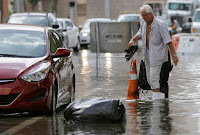A new scientific report finds man-made climate change played some role in two dozen extreme weather events last year but not in a few other weird weather instances around the world.
An annual report released Thursday by the National Oceanic and Atmospheric Administration found climate change was a factor, however small or large, in 24 of 30 strange weather events. They include 11 cases of high heat, as well as unusual winter sunshine in the United Kingdom, Alaskan wildfires, and odd "sunny day" flooding in Miami.
The study documented climate change-goosed weather in Alaska, Washington state, the southeastern United States, Canada, Europe, Australia, China, Japan, Indonesia, Sri Lanka, the western north Pacific cyclone region, India, Pakistan, Egypt, Ethiopia, and southern Africa.
"It has to be measureable. It has to be detectable. There has to be evidence for it and that's what these papers do," said NOAA scientist Stephanie Herring, co-editor of the report.
In six cases — including cold snaps in the United States and downpours in Nigeria and India — the scientists could not detect climate change's effects. Other scientists, though, disputed that finding for the cold snap that hit the Northeast.
Herring highlighted the Miami flooding in September 2015. Because of rising sea levels and sinking land, extremely high tides flooded the streets with 22 inches of water.
"This one is just very remarkable because truly, not a cloud in the sky, and these types of tidal nuisance flooding events are clearly become more frequent," she said.
...
For the February 2015 Northeast cold snap, other scientists have connected the polar vortex pushing south to shrinking ice in the Arctic Ocean.
Judah Cohen, seasonal forecasting chief at Atmospheric Environmental Research in Lexington, Massachusetts, said he even predicted the 2015 polar vortex because of the low sea ice. He said the same thing is happening with the bitter cold hitting the U.S. this week.
Read more at Global Warming's Fingerprints Seen in 24 Weird Weather Cases

No comments:
Post a Comment